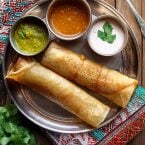Description
Dosas are delicious traditional South Indian crepes made from fermented rice and lentil batter. The batter is made by soaking, grinding, and fermenting rice and urad dal separately, creating a crispy, golden pancake. Serve with chutneys or fill with your favorite foods!
Ingredients
1 1/2 cups (300 grams) parboiled rice, washed and soaked overnight
1/2 cup (100 grams) split urad dal (skinless), washed and soaked overnight
2 tablespoons semolina or poha (flattened rice)
1 tablespoon salt
Oil, as needed (oil spray recommended)
Equipment You'll Need:
Griddle or flat non-stick pan Spatula Wet grinder or powerful blender Cloth for oiling panInstructions
Step 1: Soaking the Ingredients
-
Rinse rice and urad dal separately under running water until water runs clear.
-
Soak rice and dal in separate bowls, covering with plenty of water. Allow them to soak for at least 6 hours or preferably overnight (8-12 hours).
Step 2: Grinding the Batter
-
Drain water completely from soaked rice and dal.
-
Using a wet grinder (or blender), grind rice separately into a fine, smooth batter. Transfer rice batter to a large bowl.
-
Next, grind the urad dal separately until smooth and fluffy, adding a little water if needed.
-
Mix both rice and dal batter together thoroughly, adding semolina or poha and salt. Stir well to combine.
Step 3: Fermentation Process
-
Cover the bowl with a lid that allows slight airflow (not airtight).
-
Place the batter in a warm location (ideally around 80-85°F/27-29°C) overnight for fermentation. Batter will nearly double in volume and become bubbly after fermentation.
Step 4: Preparing the Griddle
-
Heat griddle or pan on medium-high heat. Sprinkle a few drops of water; if it immediately sizzles and evaporates, the pan is ready.
-
Prepare an oil-water mixture by combining ½ tablespoon of oil with 2 cups water in a small bowl. Use this mixture to grease and clean the griddle between dosas.
Step 5: Making the Dosa
-
Spray or lightly drizzle oil onto the hot griddle.
-
Dip a clean cloth lightly into the oil-water mixture, squeeze out excess liquid, and quickly wipe the griddle to evenly distribute the oil.
-
Pour about ½ cup of dosa batter onto the center of the griddle. Immediately swirl outward in circular motions using the back of the ladle, creating a thin, even crepe.
-
After approximately 8-10 seconds, drizzle or spray some oil around edges and on top of dosa.
Step 6: Cooking and Serving
-
Cook until the dosa turns golden brown and crispy around the edges (about 1-2 minutes).
-
Optionally, add your choice of filling (e.g., potato masala, cooked veggies, or meat) to the center.
-
Carefully fold the sides of dosa over the filling or serve plain.
-
Serve hot with coconut chutney, tomato chutney, or traditional sambar.
Notes
Proper fermentation is essential for authentic flavor and crispy texture.
The batter consistency should be thin enough to spread easily but thick enough to hold shape.
Refrigerate leftover batter covered loosely; it stays fresh for 2-3 days.
Adjust heat if dosa browns too quickly or remains pale.
- Prep Time: 20 mins
- Soaking and Fermenting: 10 hours
- Cook Time: 30 mins
- Category: Side Dish
- Method: Griddling
- Cuisine: Indian
Nutrition
- Serving Size: 1 dosa
- Calories: 105
- Sugar: 0.2g
- Sodium: 150mg
- Fat: 1.5g
- Saturated Fat: 0.2g
- Unsaturated Fat: 1g
- Trans Fat: 0g
- Carbohydrates: 19g
- Fiber: 1g
- Protein: 4g
- Cholesterol: 0g
